Auburn University Rural Health Initiative
- Need: To expand healthcare access in rural Alabama communities.
- Intervention: The Auburn University Rural Health Initiative is working with communities across Alabama to develop a healthcare model that includes primary care, substance use disorder treatment and mental health treatment via state-of-the-art telehealth technologies, coupled with health and wellness programs and services provided by faculty and students.
- Results: As of 2025, there are five telehealth care stations open located in LaFayette, Boligee, Akron, Catherine, and Gainesville, Alabama. These stations have impacted over 3,400 individuals, with 187 community events, 1207 patient consultations, and 43 new health ambassadors.
Description
The Auburn University Rural Health Initiative (RHI) is a multidisciplinary effort to address health disparities and expand healthcare access across Alabama's rural communities. Spearheaded by University Outreach and Alabama Extension, and supported by Auburn University's Colleges of Pharmacy, Nursing, Human Sciences, Education, and Science & Mathematics. RHI blends state of the art telehealth with in-person care, education, and community empowerment.
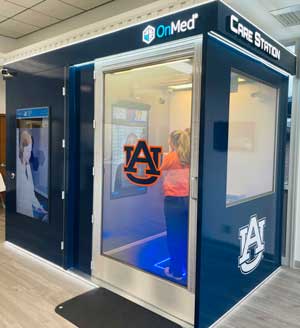
At its core, the initiative centers around innovative care models, including telehealth care stations, mobile telehealth carts, and health and wellness centers, where patients receive real-time consultations with licensed clinicians through sustained partnerships with local leaders and organizations. These care models are seen throughout Alabama in Chambers, Wilcox, Hale, Greene, and Sumter County. Plans are underway to expand to 10 other locations in rural Alabama. By investing in infrastructure, community capacity, and university resources, the initiative fosters holistic health solutions tailored to the unique needs of each rural area it serves.
Beyond direct care, the Rural Health Initiative empowers individuals to become active participants in their own health, while simultaneously training the next generation of healthcare professionals through immersive, real-world experiences.
Services offered
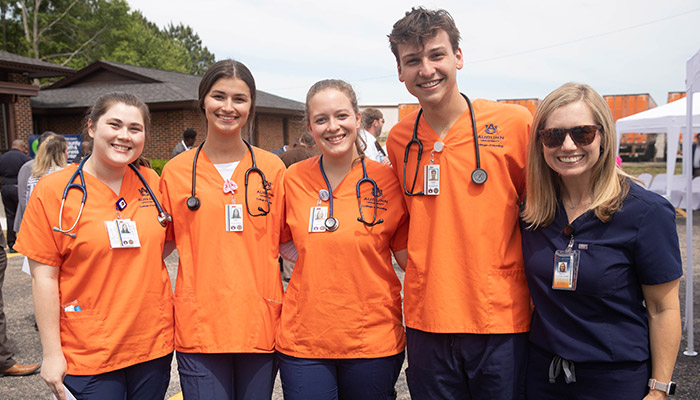
The Auburn University Rural Health Initiative provides a wide array of services aimed at improving access, awareness, and health outcomes.
Telehealth care stations are at the heart of the Initiative's healthcare delivery. These care stations connect residents directly with Alabama-licensed clinicians via secure video calls. Patients are guided through appointments using advanced diagnostic tools, including an automated blood pressure cuff, stethoscope, and handheld exam camera. Real-time data transmission allows clinicians to evaluate symptoms, make diagnoses, and prescribe treatment plans on the spot. This model dramatically reduces barriers to care – especially for residents living far from traditional healthcare facilities.
In addition to telehealth services, the Initiative facilitates in-person clinical services and wellness support through a network of Auburn faculty, students, and community volunteers. Services include:
- Primary care clinics
- Hearing screenings
- Weekly blood pressure screenings and follow-up education
- Asthma management education and screenings
- Nutritional consultations
- Cooking demonstrations
- Sport physicals
- Speech screenings and therapy sessions
- Two interprofessional education days per semester
- Vaccine clinics
- Medication management courses
- Health insurance assistance
- Maternal health education
The Rural Health Initiative also serves as a hub for student development and experiential learning. Through fellowships, graduate assistantships, and internships, students from various disciplines gain hands-on experience in community health engagement, interprofessional collaboration, and rural medicine.
Programs
RHI operates a wide variety of community-centered programs designed to bridge health gaps, promote wellness, and empower both residents and students across Alabama's rural communities. These programs are rooted in collaboration, education, and long-term community engagement.
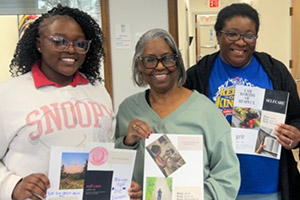
- Health Ambassadors are trusted community members who serve as liaisons between RHI and their neighbors. Ambassadors promote healthy habits, share resources, and support outreach efforts in their local communities. Monthly educational meetings keep ambassadors informed and connected while equipping them with practical tools and knowledge to guide others in making positive health decisions. This peer-led model strengthens local ownership of wellness efforts and helps sustain the Initiative's impact between visits and clinics.
- Rural Health Connect is a student organization at Auburn University that creates meaningful partnerships between students and rural residents. Through structured mentorship and shared wellness goals, students provide support in areas such as physical activity, nutrition, mental health awareness, and chronic condition management. The program encourages mutual learning and personal accountability as students and rural residents work together to improve health outcomes.
- Healthy Temple Initiative: This faith-based outreach program engages rural churches and spiritual leaders in the health and wellness conversation. The Healthy Temple Initiative integrates health education into worship services, church events, and spiritual teachings. The program promotes holistic health by blending mental, physical, and spiritual wellbeing, empowering church leaders to serve as advocates for healthier lifestyles.
Student engagement is a cornerstone of the RHI's mission. In 2024, 190 students contributed more than 3250 hours of service at health and wellness sites across the state. 22 students held formal leadership roles, while many others were given the opportunity to launch their own grassroots health programs tailored to specific community needs. These student-led programs included:
- Micro Food Pantry
- Community Garden
- Maternity Closet
- The Donated Hearing Aid Project
- Period Poverty in High School Females
- Walk & Talk for Youth
- The Period Pantry
- Blood Pressure & Daily Management
- Examining Data for Health in East Alabama
- Exploring Easy Lifestyle Changes
- Tree of Giving
- Mental Health Awareness
- Vaccine Administration
Results
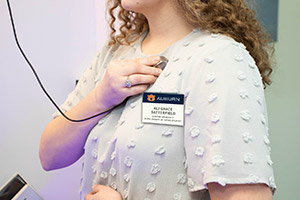
Since launching its telehealth care station in Chambers County in April 2023, RHI has made significant progress in expanding healthcare access, promoting community wellness, and fostering student engagement across rural Alabama. Between April 2023 and April 2024, the telehealth stations facilitated 592 patient consultations and generated 720 prescriptions. By October 2023, usage had steadily increased to an average of over 80 visits per month.
Patient survey results have been overwhelmingly positive. Of 127 participants surveyed, 98% reported that their health needs were met well or very well, and 97% felt confident using the station. Notably, only 24% said they would have visited a primary care provider if the station were unavailable, while 15% indicated they would have gone to the ER or done nothing. In total, 69% of patients reported receiving information or help they wouldn't have found elsewhere, and 100% agreed that the station was private and easily accessible. Conditions most treated included ear, nose, and throat issues, followed by respiratory concerns. The most frequently prescribed medications were antibiotics, cough suppressants, and oral steroids.
A total of 560 individuals have participated in community engagement events hosted by RHI, including 187 events and over 1,200 telehealth consultations. Student involvement has been a core focus, with 190 Auburn students engaged in center activities. Of those, 25 students completed 50 or more service hours, and 5 interns each contributed 450 hours. Students also participated in Interprofessional Education (IPE) days, providing an additional 8–16 hours of support per visit. The University of West Alabama contributed 5 students in 2024 through the CMC grant, adding 350 hours in support of internet installations, marketing, outreach, and programming at 4 telehealth station sites. RHI also partnered with faculty from 10 different colleges on Auburn's campus, creating hands-on educational experiences that simultaneously benefit community members and strengthen academic learning.
This momentum has been made possible through a broad coalition of supporters, including private donors, Alabama Blue Cross Blue Shield, the Alabama Department of Economic and Community Affairs, ALFA Insurance, the U.S. Department of Agriculture, the U.S. Department of Treasury (Federal Award #SLFRP2635), local governments, and various grants such as those from the Alabama Association of RC&D Councils.
The diagram below illustrates the far-reaching benefits of the initiative, from increased trust in local healthcare systems to meaningful student development and empowered rural communities.
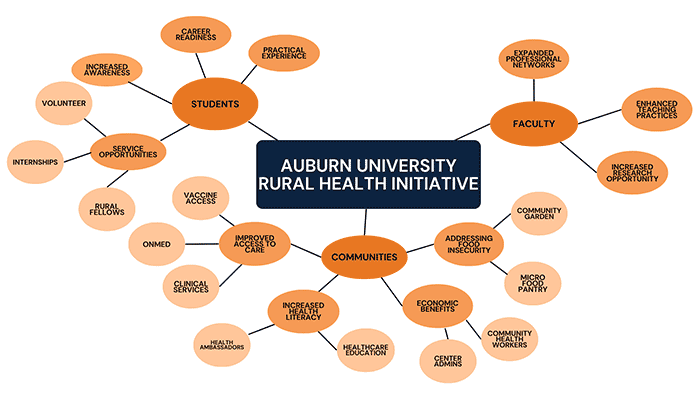
Survey Data
- 98% of participants indicated health needs were met very well or well
- 97% agreed or strongly agreed that they felt confident using the care station
- 100% agreed or strongly agreed that the care station was private and easily accessible
- 71% of participants said they heard about the station from a friend or family member
- 69% of participants received information they would not have otherwise received
Selected Media Coverage
- "Remote Doctor Visits Have Become a Staple of Modern Health Care," Business Alabama
- "State Awards Auburn $2M to Spearhead Innovative Rural Health Care Access Project," Yellowhammer News
- With Its Two Doctors Planning to Retire, an Alabama Town Patches Together Health Care Options, KFF Health News
- Auburn University Partnering With Chambers Co. to Increase Affordable Health Care, WTVM
- LaFayette Residents Finding OnMed Telehealth Station a Great Option in Health Care, Alabama Cooperative Extension System
- Alabama Extension, Auburn Outreach Partner With OnMed to Bring Health Care Solutions to Chambers County, Alabama Cooperative Extension System
Challenges
While RHI has achieved substantial impact across rural Alabama, it has also faced several challenges inherent in implementing health programs in underserved areas. One of the most significant obstacles has been building a strong, sustainable local network to ensure that community members are genuinely involved in every decision and implementation step. Establishing trust in rural communities—where there may be skepticism toward new healthcare systems and external organizations—requires consistent, personal engagement and a deep understanding of local values and needs.
To address this, RHI created a coalition of community Health Ambassadors made up primarily of youth and retirees. These volunteers act as trusted messengers, promoting healthy behaviors and connecting neighbors to available services. Their involvement has been essential in spreading awareness, increasing telehealth usage, and ensuring that RHI remains grounded in community input.
Additional challenges include securing accessible and reliable locations for telehealth stations, especially in areas with limited infrastructure or broadband connectivity. The team has also navigated the competitive landscape of public health funding, where many organizations vie for limited resources. Even as RHI continues to grow, the pressure to identify and secure ongoing funding remains constant, requiring persistent grant writing, donor cultivation, and strategic partnerships.
Despite these hurdles, RHI remains committed to its mission, continually learning and adapting to better serve Alabama's rural populations with dignity and respect.
Replication
The RHI team has focused on building a model that can be replicated across the state, realizing that every community is unique. They have adhered to a 4-step process to implement their patient-centered model.
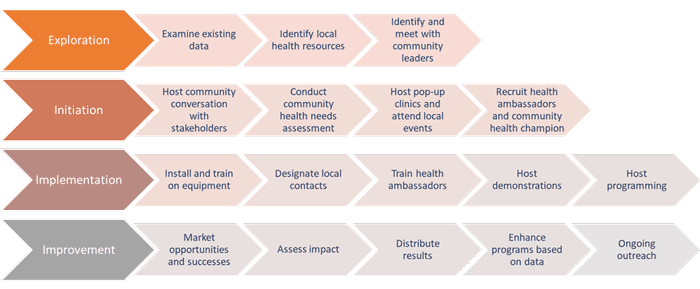
Additionally, the RHI team has created a blueprint that includes a task tracker as well as multiple sample documents for reference. The most important step in this process is building relationships within the community, truly understanding local needs and assets, and building a coalition of partners that includes community leaders, community members, local health providers and university faculty and staff.
Contact Information
Hollie C. Cost, Ph.D., Assistant Vice President for University Outreach and Public ServiceAuburn University
Auburn University Rural Health Initiative
334.740.2897
hac0043@auburn.edu
Topics
Access
· Health professions faculty
· Health workforce education and training
· Networking and collaboration
· Telehealth
· Wellness, health promotion, and disease prevention
States served
Alabama
Date added
May 7, 2024
Suggested citation: Rural Health Information Hub, 2025 . Auburn University Rural Health Initiative [online]. Rural Health Information Hub. Available at: https://www.ruralhealthinfo.org/project-examples/1138 [Accessed 22 February 2026]
Please contact the models and innovations contact directly for the most complete and current information about this program. Summaries of models and innovations are provided by RHIhub for your convenience. The programs described are not endorsed by RHIhub or by the Federal Office of Rural Health Policy. Each rural community should consider whether a particular project or approach is a good match for their community’s needs and capacity. While it is sometimes possible to adapt program components to match your resources, keep in mind that changes to the program design may impact results.
